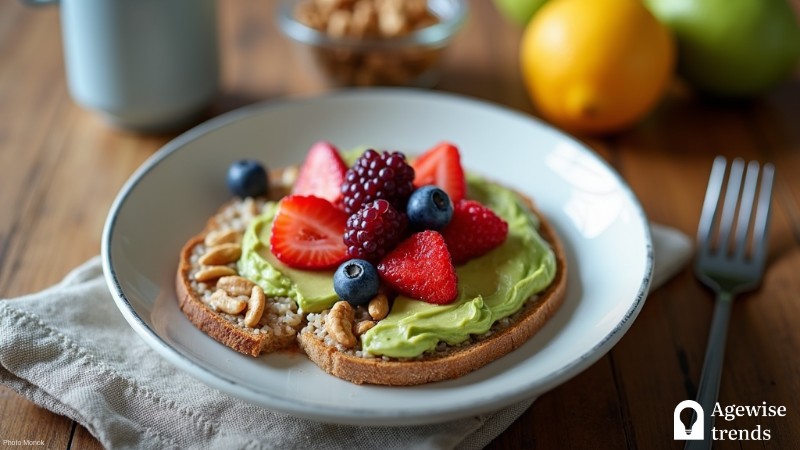Getting a good night’s sleep is essential for overall health, but many struggle to find restful slumber. What you eat plays a significant role in determining the quality of your sleep. Research from sleep experts like Dr. Marie-Pierre St-Onge and Dr. Rachel Salas reveals that specific foods can either promote deep, restful sleep or disrupt it. By incorporating the right foods into your diet and avoiding sleep-disrupting options, you can significantly improve the quality of your rest.
The key to better sleep: A balanced diet
A sleep-friendly diet focuses on promoting the production of important hormones like serotonin, melatonin, and tryptophan. These substances regulate your sleep-wake cycle, ensuring that your body is prepared for rest.
Additionally, avoiding certain foods that disrupt sleep—such as caffeine, alcohol, and spicy meals—can improve sleep quality significantly. Below are some dietary tips to help you sleep better.
Incorporate tryptophan-rich foods
Tryptophan is an amino acid that plays a vital role in sleep regulation. It is found in protein-rich foods like turkey, chicken, salmon, eggs, and yogurt. Eating tryptophan-rich foods during the day can promote higher serotonin levels, which in turn helps you fall asleep faster and experience more restful sleep.
Combining tryptophan-rich foods with complex carbohydrates, like whole grains, fruits, and vegetables, creates an environment where serotonin can be released gradually. This combination facilitates a slow and steady release of insulin, which helps tryptophan cross into the brain more efficiently, improving sleep quality.
Avoid caffeine and Alcohol Before Bed
Caffeine is a well-known stimulant, but it can surprise many to learn that it is found in a wide range of foods and beverages. Energy drinks, chocolate, and even some decaffeinated coffees can contain enough caffeine to disrupt sleep. Research suggests that even decaffeinated coffee can have more caffeine than people realize, potentially keeping them awake longer.
Alcohol may help you fall asleep faster, but it disrupts restorative sleep stages and can cause issues like sleep apnea or sleepwalking over time. To improve sleep, limit caffeine and alcohol before bed and try tart cherry juice, which naturally boosts melatonin, a hormone that regulates sleep.
Choose foods high in magnesium
Magnesium is crucial for relaxation and helping the body unwind before sleep. It has been shown to help regulate sleep patterns by reducing inflammation and improving the body’s ability to transition into sleep. Magnesium-rich foods like dark leafy greens, nuts, seeds, and legumes should be included in your diet to promote better sleep.
Adding magnesium to your diet helps calm your muscles and nervous system, ensuring that your body can truly relax before bed. A calming bedtime snack, such as a small portion of nuts or seeds, can help your body wind down naturally.
Foods to avoid for better sleep
While certain foods help promote sleep, others can interfere with your rest. It’s important to avoid foods that can trigger indigestion, increase body temperature, or disrupt hormonal balance, especially in the hours leading up to bedtime.
Spicy foods and heartburn: Spicy foods can trigger heartburn, which worsens when lying down, leading to a restless night. They also raise your core temperature, disrupting your body’s natural cooling process before sleep. To avoid these issues, avoid spicy and acidic foods, like tomato sauce, at least three hours before bedtime.
High-fat and high-protein meals: Heavy, fatty meals like steak, chicken, and processed cheeses can disrupt sleep by slowing digestion. High-fat diets may also affect sleep patterns due to internal clock disruptions.
For better sleep, choose light, easily digestible meals like complex carbohydrates. Oatmeal or whole-wheat toast can boost serotonin levels, promoting restful sleep without taxing digestion.
Limiting ultra-processed foods: Lastly, ultra-processed foods—those high in sugar, preservatives, and unhealthy fats—should be minimized in your diet. These foods can lead to spikes in blood sugar and hormonal imbalances, both of which disrupt the body’s natural sleep-wake cycle. Choose whole, nutrient-rich foods that support the gut and overall health for better sleep.
By following these tips, you can make meaningful changes to your diet that will improve your sleep quality. Whether it’s by incorporating tryptophan-rich foods, avoiding sleep-disrupting beverages, or adding magnesium, small adjustments to what you eat can lead to better rest and improved overall well-being.














